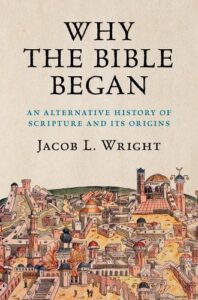
Why the Bible Began: An Alternative History of Scripture and its Origins, with Jacob L. Wright
Click here to register for this free virtual event.

The Bible’s existence, according to Jacob Wright, is not only a testimony of survival, but an unparalleled achievement in human history. Forged during Babylonian exile after the shattering destruction of Jerusalem, the Bible places total humiliation at the foundation of a new idea of belonging. Lamenting the destruction of their homeland, the scribes who composed the Bible turned to the golden ages of the past, reflecting deeply on abject failure. As a response to catastrophe, it offers a powerful message of hope and restoration that is unique among Ancient Near Eastern and Greco-Roman texts. For Wright, the Bible is thus a social, political, and even economic roadmap — one that enabled a small and obscure community located on the periphery of leading civilizations and empires, not just to come back from the brink, but ultimately to shape the world’s destiny. It speaks ultimately of being a united, yet diverse people, and its pages present a manual of pragmatic survival strategies in response to societal collapse.
Jacob L. Wright is associate professor of Hebrew Bible at the Candler School of Theology, Emory University. He is the author of Rebuilding Identity: The Nehemiah Memoir and its Earliest Readers (de Gruyter, 2004), David, King of Israel, and Caleb in Biblical Memory (Cambridge University Press, 2014), and War, Memory, and National Identity in the Hebrew Bible (Cambridge University Press, 2020). He is a frequent contributor to archeology and history documentaries. His six-week Coursera course, “The Bible’s Prehistory, Purpose, and Political Future,” has reached more than 60,000 students.